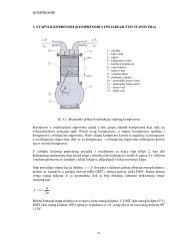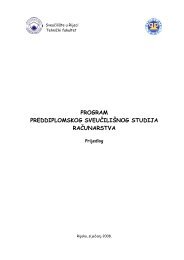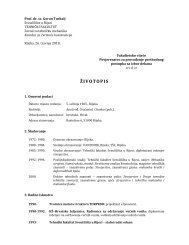universityâenterprise cooperation
universityâenterprise cooperation
universityâenterprise cooperation
Create successful ePaper yourself
Turn your PDF publications into a flip-book with our unique Google optimized e-Paper software.
114<br />
6.3.5 Setting up of Open Innovation Networks<br />
with SMEs<br />
Since networks of knowledge and services in<br />
the area engineering technologies have been<br />
existing in the world for many years now, as<br />
well as networks of technology transfer, linking<br />
with those networks and active participation in<br />
exchange of experience can be set as a priority<br />
in fostering <strong>cooperation</strong> among universities<br />
and enterprises. Close <strong>cooperation</strong> between<br />
industry and university, and among different<br />
enterprises in the same supply chain, and even<br />
among competitors, has proved the best way<br />
to gain flexibility, get access to critical knowhow<br />
and share research costs.<br />
Learning from each other by networking is a<br />
well tested method in European countries for<br />
effective transfer of knowledge and technologies.<br />
Network based innovation programs are especially<br />
beneficial for small and medium sized enterprises.<br />
Improved level of services (R&D) for innovative<br />
enterprises, in line with their needs, can increase<br />
motivation of enterprise for <strong>cooperation</strong> with<br />
university and its research centres. On the<br />
other hand, better understanding of needs of<br />
SME and large enterprises by university centres<br />
which support innovations and research can<br />
give a quality and applicable R&D result, which<br />
will be easily commercialized. That way set off<br />
participation in financing and regular application<br />
of innovations in companies.<br />
Involvement of university structures in development<br />
and managing of innovation networks in different<br />
fields with regional enterprises could be<br />
facilitator of mutual <strong>cooperation</strong> in future,<br />
as well as efficient tool for modernization of<br />
university towards society needs.<br />
6.3.6 Practical placements for students in<br />
industry<br />
A number of courses within curricula of<br />
engineering study incorporate practical<br />
placement of students. Practical placement<br />
takes place in a company selected by the<br />
student. Depending on the duration of the<br />
practical placement, the extent of the course<br />
is 3–9 ECTS credits. In the last ten years, in<br />
the period of transition to market economy<br />
and privatization in the WBC region, there<br />
was an important decline in higher education<br />
- industry relations, thus students did not<br />
have quality organized practical placement<br />
in industry. On the other hand, faculties<br />
and university do not support institutionally<br />
implementation of this obligatory course.<br />
The project WBC-VMnet envisages improving<br />
of existing practical placement realization<br />
at WBC engineering study, through welldefined<br />
and sustainable Practical Placement<br />
Programme (PPP) for students, providing<br />
them the opportunity to gain practical<br />
experience of industry in an area that relates<br />
to their academic studies, and to further<br />
develop their professional, technical and<br />
interpersonal skills. Students thus have the<br />
opportunity to make use of their knowledge<br />
in practice and to tune it to the actual needs<br />
of the industrial environment. According to<br />
this PPP programme students will work in the<br />
company for minimum 1 month (6 ECTS).<br />
PPP programme should specify mutual<br />
obligations and claims, for the host company<br />
and for the student, incorporated in<br />
the contract. University (CTC, LLL, Career<br />
Development Centre or other similar units)<br />
should perform all administrative and<br />
management activities. All interested students<br />
fill up Application form, thus university can<br />
offer the interested companies with suitable<br />
students. The company can select the student<br />
according to the interview.<br />
Benefits for enterprises and the companies<br />
will be in the input of fresh ideas and skills,<br />
developing links with universities and the<br />
opportunity to assess prospective employees.<br />
Students gain through obtaining a well<br />
rounded degree, having chance to apply<br />
their theoretical knowledge to real industry<br />
situations, and obtaining suitable experience<br />
recognized as part of the training requirement<br />
by the professional institutions.<br />
6.3.7 Industrial fellowship programme<br />
(IFP) for graduates and/or employees from<br />
enterprises<br />
Industrial Fellowship Programme (IFP) is<br />
intended to establish sustainable partner-
















